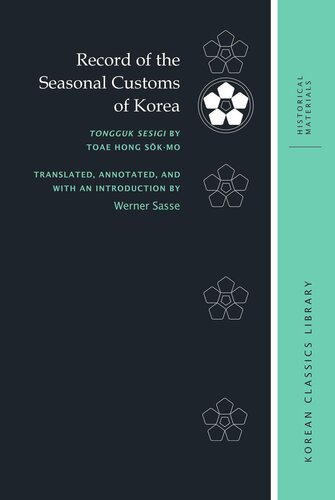

Most ebook files are in PDF format, so you can easily read them using various software such as Foxit Reader or directly on the Google Chrome browser.
Some ebook files are released by publishers in other formats such as .awz, .mobi, .epub, .fb2, etc. You may need to install specific software to read these formats on mobile/PC, such as Calibre.
Please read the tutorial at this link: https://ebookbell.com/faq
We offer FREE conversion to the popular formats you request; however, this may take some time. Therefore, right after payment, please email us, and we will try to provide the service as quickly as possible.
For some exceptional file formats or broken links (if any), please refrain from opening any disputes. Instead, email us first, and we will try to assist within a maximum of 6 hours.
EbookBell Team

4.7
96 reviewsRecord of the Seasonal Customs of Korea (Tongguk sesigi) is one of the most important primary sources for anyone interested in traditional Korean cultural and social practices. The manuscript was completed in 1849 by Toae Hong Sŏk-mo, a wealthy poet and scholar from an influential family. Toae, with his keen interest in the habits and customs of both courtiers and commoners, compiled in almanac form (he divided his book into chronological sections by lunar and intercalary months) a comprehensive record of seasonal palace events, rituals, entertainment, and food and drink consumed on high days and holidays, as well as information on farm work and traditions.
Nineteenth-century Korean intellectuals possessed a deep understanding of Chinese history and culture together with a growing awareness of the distinctiveness of Korea’s past and traditions. Toae’s work reflects this in the many comparisons he makes between the habits and customs of the two countries, quoting literary and philosophical sources to note similarities and contrasts. Knowledge of the seasonal traditions he describes was largely forgotten over the generations as Korea rapidly modernized, but in recent years much effort has been made to recover this wisdom: Tongguk sesigi is now widely read and referenced as a popular source for details on traditional food, customs, and entertainment.
While an ever-increasing number of books introducing Korean culture written by non-Koreans or Koreans researching their roots is now available, Record of the Seasonal Customs of Korea contains information “from the source” that also reveals the mindset and penchants of a premodern Korean intellectual. Readers will thus be confronted with many concepts, names, and ideas not readily understandable so extensive notes are provided in this translation. Those studying other Asian cultures with some Chinese influence will also find valuable insights here for cross-cultural comparison and research.